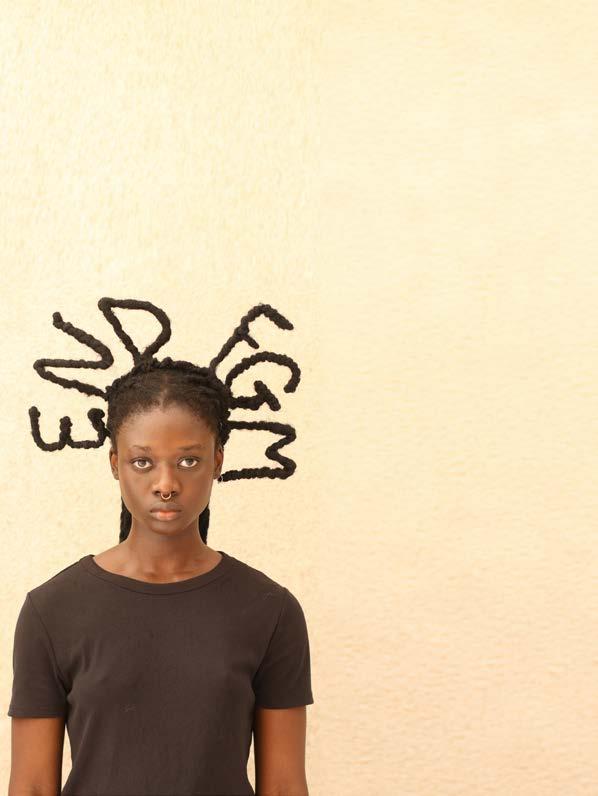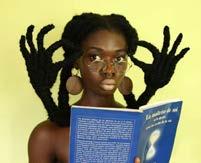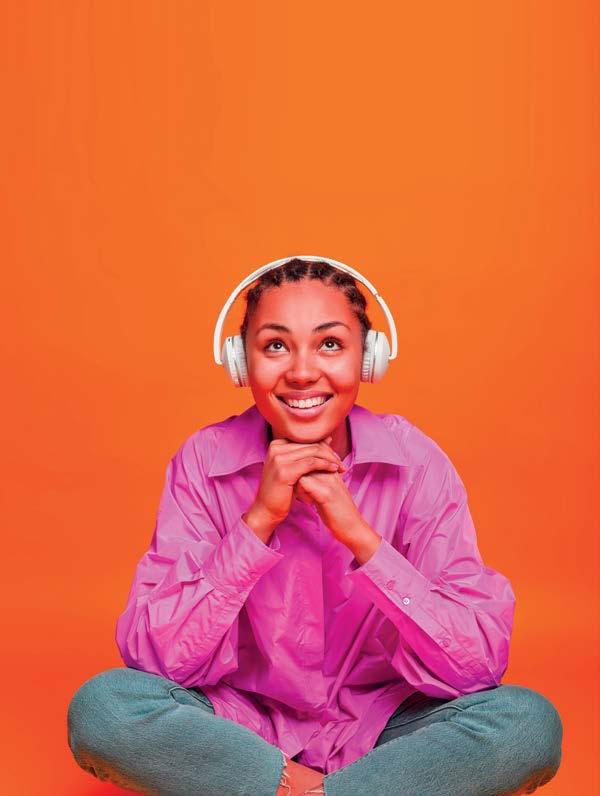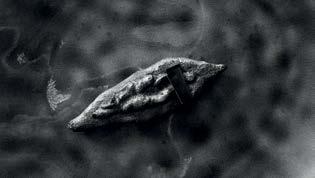
7 minute read
Champions: Dr. Morissanda Kouyaté (MD,Ph.D)
lAETITIA KY
Even the Hair Says No To FGM!
Advertisement
lAETITIA KY, oN A MIssIoN To FIGHT soCIAl INJUsTICE THRoUGH CREATIVE HAIR ART
My culture, my experience, the experiences of other women, equality of sexes, the news, an image, a sound, a smell... literally the world around me can inspire me to create a piece.
I was originally inspired by a photo album of the hairstyles of African women before colonisation. Their hair was comparable to sculptures. It made me want to experiment and when I posted the first style, the love and support from my surroundings made me continue until one of my photo series went viral. When I realised my work had an impact, I associated my activism with it. black hair is political. It is considered less beautiful than other hair types. Using it to create art is a beautiful way to show that society is wrong. It is a beautiful way to help young black girls be more confident.
Why did you join uNFPA “16 Days of Activism” campaign to share womens’ stories?
Every year on the 25th of November there is an international campaign with activists for the equality of sexes. last year, I really wanted to participate more. For 16 days, I wanted to speak about something. I’m fighting for myself, but also fighting for other women. When I share things [on social media], most of the time I share my stories but there are also women that follow me, so I questioned, why not share their stories? so I took my phone, and told them about the 16 Days of Activism, saying, “send me your story, I want to share it. It can be anonymous, or I can put your name if you want to have other women relate to it better and to know that they are not alone.” My [personal messages] went wild! I’m not going to lie, I occasionally felt that I should not have started this because it was pretty horrible reading these stories. seeing so many stories of abuse, violence, and pure cruelty - and seeing that some of those women are still in those situations can be really heartbreaking and was really hard on my mental health. It was very difficult. but I’m happy that I did it and I will do it again, even if it’s not easy.
What is your perspective on FGM?
sex-based oppression does exist in some parts of the world, especially if you were born with female biology. sex-selective abortion and the lack of education on FGM, child marriage, period stigmatisation, teen pregnancy, breast flattening, the right to abortion, gynaecological and obstetrical violence and breastfeeding stigmatisation are just some areas that we need more women to speak about. This led me to actively take part in the UNFPA campaign to end FGM.
You shared a powerful video with uNFPA, what was the key message?
I used my hair to share how I felt about FGM while using my creative hair artistry to communicate it.It was truly fullfilling bringing this to live. below is the content we shared to thousands of girls, women and the rest of the world.
“It happens when she has no means to protect herself. When she is a child or a young girl. When she is the most vulnerable. When she can’t have a say over her body. Her body is violated. Her right to physical integrity is taken, cutting through her body, dignity and future,in the name of social norms, she has no choice but to go through pain, so deep it lasts a lifetime.
In the name of culture, she is dehumanised, humiliated and mutilated. Her fire is controlled, her voice and desire are annihilated, and if she is lucky to survive, she will live a life where physical pain, mental pain and trauma are her everyday reality.
Don’t they know the future of our world depends on a healthy young generation?
Don’t they know that the future includes the dignity and health of girls in every nation?
We must protect our girls from this harmful practice, We must protect our girls and not allow any norms to blind and distract us. Because these girls are human, because these girls have a right to be free from discrimination, and protected from all forms of violence and right’s violations. Because the protection of girls and women are our wealth as a society. And we need to use our voices and actions to show that we care for their prosperity.
Because these girls and women need to have the right to live in a world free from FGM, where they have a voice, choice and agency. Because the life of girls is valuable. We need to fight to end FGM, for a world where every human including women, can thrive.”

thanks for joining us share more insights laetitia, together we are stronger and we should continue to use our influence to make this world a place where women will not be discriminated against because of their biology.
How ForWarD Uses art to say No to FGM
Arts and culture builds and binds people together. Culture and art generates social capital and strengthens a community’s character. Music brings people together, through its capacity to tell a community’s shared story, to inspire reflection, and form connections that transcend differences. Music is a way of life for many.
Foundation of Women’s health research
African women-led women’s right organagainst women and girs has created an (dancers, musicians, song writers and together on a single platform and and Development (FOrWArD), an isation working to end violence international network of artists more) to bring their expertise help end FGM.
Arts provides a unique opportunity a greater audience, so FoRWARD for using expressive lyrics, dance, some examples are “Tradition Runs about bodies) in collaboration with the and many others.
to raise awareness and reach concerts are typically known music etc for this purpose. Deeper Than law” (something artist Tamiola, Hidden scars,


It is worth noting, these the understanding of the tional background of this complexities that sociewhile trying to eradicate artists believe they have sibility to question, take action, so you the movement and what part you’ll like concerts help deepen cultural and tradipractice and the ties encounter it. The member a social responcomment and should join decide to play.


“let’s sing, Cut no more”- Using Music To End FGM in africa
After four months of hard work, sally Njie and Praise Gimba are proud to release their new song. ‘Cut No More’ delivers a catchy melody but it also shares an important message: warning about the risks of FGM. Even more impressive? It does this in three different languages – Wolof, Mandinka and English.
“This will help the people in the community better understand the message”, says Jama Jack, Project Mentor at partner organisation “Think Young Women”.
Ms. Njie and Ms. Gimba are part of the Tuwezeshe spotlight Fellows Programme, a one-year programme that is supported by the spotlight Initiative and implemented by the UNFPAUNICEF Joint Programme on the Elimination of FGM and FoRWARD UK.
Fifty young women in Africa and 16 in Europe underwent the training, which aims to eliminate FGM, child marriage and related forms of violence against women and girls by inspiring and nurturing leadership skills and activism among young women from Africa and the diaspora.
However, creating a song in different languages proved to be a challenge. “one obstacle we had with creating the song was language and choosing the right words to transmit the message across the tribes. After our first recording was done and evaluated, we had to go back to the studio and re-record the song due to terminology issues with the Wolof word for ‘circumcision,’” explained sally Njie.
“our supervisor was helpful, she evaluated everything and even shared it with the rest of the team to help make necessary adjustments.”
both the programme and the song were collaborative and global.
“We partnered with three organisations including Nairobibased Akili Dada wa Africa; the brussels-based End FGM European Network; and Think Young Women, based in banjull, the Gambia,” said Executive Director of FoRWARD, Ms Naana otoo-oyortey. “The initiative focused on virtual and in-person intensive feminist leadership training, a sub-grant and mentoring support to conduct social action projects and access to wellbeing support and sisterhood building.”
Ms. Njie and Ms. Gimba also reached out to social media influencers on different platforms such as TikTok, YouTube, Instagram and Twitter.
“Most young people are active on social media platforms these days. so, it will be very hard not to come across our song on any of those platforms, especially when we have some influencers coming on board with the distribution,” said Ms. Njie.
Three female artists agreed to join the project and were involved in the entire songwriting process.
“As a team, we are thrilled. The song we worked on is really beautiful, very catchy and melodious,” said Ms Gimba.

By Fahmia Al-Fotih










